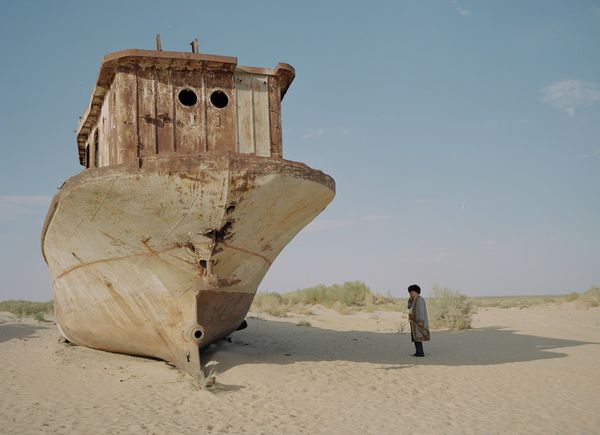 |
| Waiting For The Sea |
Speaking about the inception of the festival, Maria says: “It’s really one of those things that came out of the situation last year, when the pandemic started. We wanted to help the filmmakers and help the whole industry in the region, in a way. And in the end, we managed to put together a programme for a whole week. The response was great. It was the first time we tried something like that. And we're saw that our audience was really eager to see the films.”
As a result, about 5000 watched the first crop of films – including George Itzhak's award-winning documentary Waiting For The Sea and Ivan Salati?’s You Have The Night - which gave them confidence to return with an expanded edition for 2021.
 |
| Maria Muzdybaeva Photo: Courtesy of Calvert Film Journal |
Lucía adds: “Maria summarised very well the thinking behind expanding the festival. We saw that the format last year worked and we wanted to know, take it up a notch and make it into an actual festival with an official competition, etc. But there's also this element of having it open to discover more emerging talent and supporting that. Maybe films from the region, have harder time, like access to other festivals, they get this exposure. People from all over the world are going to be able to watch these films, and which is a big thing I guess, for many of the starting filmmakers, especially student filmmakers.”
So do they think that New East cinema is often poorly served by conventional distributors?
“I think that sometimes can happen,” says Maria “And I think the challenges are that sometimes people will, I'm speaking from my experience as a Russian, that sometimes people in these countries themselves are also not really interested in what local directors produce. And there is still a bit of a, ‘Oh, we want to see what Hollywood makes’ attitude. And we're trying sort of show people that, as a UK organisation, we're very much interested in what the region has to offer. Hopefully, the festival for the films that are just being released, will be an opportunity to find a distributor abroad as well. “I can't say for certain because of the pandemic situation, but we were hoping to maybe organise a few offline screening in the UK for the winners.”
The festival also, perhaps, is an opportunity to show audiences something they may not have already seen from the regions in question, with more traditional distributors often pushing very specific genres from certain regions – for example horror from Spain or gritty neo-realism from Romania.
"I think it's definitely a challenge. There’s a director from Belarus, named Dary Zhuk. She made a film called Crystal Swan. And we did an interview with her a few years back when it was just released and she said that her feedback from a festival was, literally, ‘It’s not bleak enough’ because she wanted to make a comedy. So it definitely can happen.”
Lucía adds: “I think it’s also the case with the Central Asian films. So recently, we did a feature about a new film about a homosexual relationship in Kazakhstan. And people were surprised. Central Asian cinema, cinema is booming but at the end of the day, many of the films have kind of the same aesthetic, like, nomadic lifestyle, frozen plains, etc. People are not used to seeing other stories of people that live in cities and do the same things that like people in other cities do. So I think it's definitely a problem that they're kind of boxed into a category.”
 |
| Lucía de la Torre Photo: Courtesy of Calvert Film Journal |
She adds: “Not just other countries, but also other people, how they feel how and other people's worlds. I feel like film has a very powerful impact in changing the way people perceive the region. And in changing the way people from the region perceive themselves.”
Maria adds: “I was talking to one of our jurors, and they said that this past year, we’ve really like lived vicariously through cinema and TV. Because you know, there wasn't much to do in real life for some of us. So yeah, definitely, maybe an opportunity to expand. And if you I don't know, maybe if you never thought of travelling to this country, at least you can watch a film.”
Although cinemas have largely been shuttered across the world, the expansion of streaming services has meant increasing amounts of people have a diverse range of films at their fingertips – and the fact that Netflix doesn’t make a big song and dance about what language each film is in perhaps makes it easier to stumble on something that people perhaps wouldn’t take a chance on at the cinema.
Lucía agrees that the audience has widened thanks to digital, she adds: “The digital world is kind of being demonised. But I think it does a lot in terms of democratising access. And I think that's the case for films and streaming platforms also, because you can bring it to Vimeo, and share it to other platforms. Like there's Instagram accounts that link to films, there's lots of ways promoted and it expands to other forms of art as well, like, how would photographers who don't live in like big cities and don't have access to certain circles make it if it wasn't for Instagram? So I think definitely think streaming services are positive.”
Maria adds: “I totally agree. Also, you don't have to choose just one or the other. I think I'm a huge fan of like, going to actually the theatres. And even with our festival, which is taking place online, as I said, we would really like to organise proper offline screenings. So it’s not like we're just focusing on the digital side.” This year’s festival will comprise seven categories - fiction features, documentary features, animation features, and then shorts, student films, experimental films, and a special category for minority language films.
Speaking about the selection Lucía says they’re taking the pandemic difficulties for filmmakers into account, adding: For this festival, we're considering films made in 2019, 2020 and 2021. Considering that 2020 wasn't the best year for making films? I expect lots of archive films as well, also family stories, those sort of things. It's been a mix between you can't really go anywhere, and you're stuck, like with your family, or at home.” She adds: “Now we’re very excited to see all the submissions, and can't wait to start looking through them.”
The Calvert Journal Film Festival will run in October and it is currently open for submissions. Full details of the festival and how to submit your film are available from the Calvert Journal website





















